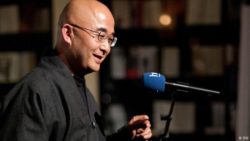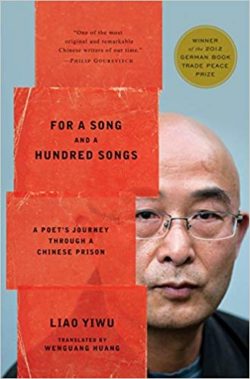June 2019: Liao Yiwu 廖亦武
 Liao Yiwu (born 1958 in Sichuan) is a Chinese author, reporter, musician, and poet. His books were published in Taiwan and Hong Kong but are banned in mainland China. He left China in 2010 and lives in Germany. His work in English includes The Corpse Walker–Real Life Stories: China from the Bottom Up and God Is Red: The Secret Story of How Christianity Survived and Flourished in Communist China, both translated by Wenguang Huang, and most recently Bullets and Opium: Real Life Stories of China After the Tiananmen Square Massacre. He has received the Ryszard Kapuściński Prize, the Hellman Hammett Grant, and the Peace Prize of the German Book Trade.
Liao Yiwu (born 1958 in Sichuan) is a Chinese author, reporter, musician, and poet. His books were published in Taiwan and Hong Kong but are banned in mainland China. He left China in 2010 and lives in Germany. His work in English includes The Corpse Walker–Real Life Stories: China from the Bottom Up and God Is Red: The Secret Story of How Christianity Survived and Flourished in Communist China, both translated by Wenguang Huang, and most recently Bullets and Opium: Real Life Stories of China After the Tiananmen Square Massacre. He has received the Ryszard Kapuściński Prize, the Hellman Hammett Grant, and the Peace Prize of the German Book Trade.
Bio adapted from Words Without Borders
Liao was in the UK this June for readings of his prison poetry and for an event at SOAS, following the 30th anniversary of the June 4th Tiananmen Square massacre. As the programme for the SOAS event points out, 'Poems are powerful. Poems are dangerous.'
 Liao was imprisoned after June 4th 1989 for writing a long poem about the massacre, and after his release in 1994 he has continued to chronicle his own experiences and those of others, speaking out about the malpractices that added to the impact of the Sichuan earthquake in 2008. He was a close friend of Liu Xiaobo and a signatory of Charter 08. He now lives in exile in Berlin.
Liao was imprisoned after June 4th 1989 for writing a long poem about the massacre, and after his release in 1994 he has continued to chronicle his own experiences and those of others, speaking out about the malpractices that added to the impact of the Sichuan earthquake in 2008. He was a close friend of Liu Xiaobo and a signatory of Charter 08. He now lives in exile in Berlin.
Michael Martin Day, a translator of Chinese poetry and fiction and an associate professor at National University in San Diego, has been Liao Yiwu's friend and translator since 1987, and has published the book China’s Second World of Poetry: The Sichuan Avant-Garde, 1982-1992, which is available here. Martin talks more about his work in our 'Talking Translation' blog interview series.
Here is his introduction to a selection of his translations of Liao's work:
"Liao began writing poetry in the late 1970s and was an award-winning poet on the official scene before devoting himself to unofficial poetry in 1984. After taking a hand in editing and contributing to a number of unofficial journals, in early 1987 Liao edited The Modern Poetry Groups of Sichuan 巴蜀现代诗群. This was after his poetry was officially blacklisted after the furor caused by the publication of 'The City of Death' in the Jan.-Feb. 1987 double issue of People’s Literature 人民文学. On June Fourth 1989, Liao went one step further in writing and having the manuscript and recorded reading of it distributed (by yours truly) throughout China and outside the country. Eventually, this and the creation of a video based on a new poem, 安灵曲, led to the arrest of Liao and five others (including Li Yawei and Wan Xia) in March 1990, and Liao being sentenced to four years confinement in March 1992, not long after the five others had been released (I was expelled from China on 30 October 1991). In prison and labour camp, Liao wrote the last of his poetry and turned his hand to prose, namely a semi-autobiography called Go On Living 活下去, the fourth part of which was published in Taiwan and the USA as Evidence 证词 in 2004. In 1997 and 1998, Liao edited the comprehensive unofficial literary journal Intellectual 知识分子, and since that time has devoted himself to interviewing individuals he terms members of China’s underclass, most of which are now published overseas on Chinese language websites."
For our book club this month we are featuring Liao's poem 'The City of Death', translated by Michael. You can read the English translation here and the Chinese original here. The poem brought Liao national notoriety upon its publication in 1987, and it was soon banned from official publication in China. We'd like to thank the author and translator for giving us permission to reprint it here.
